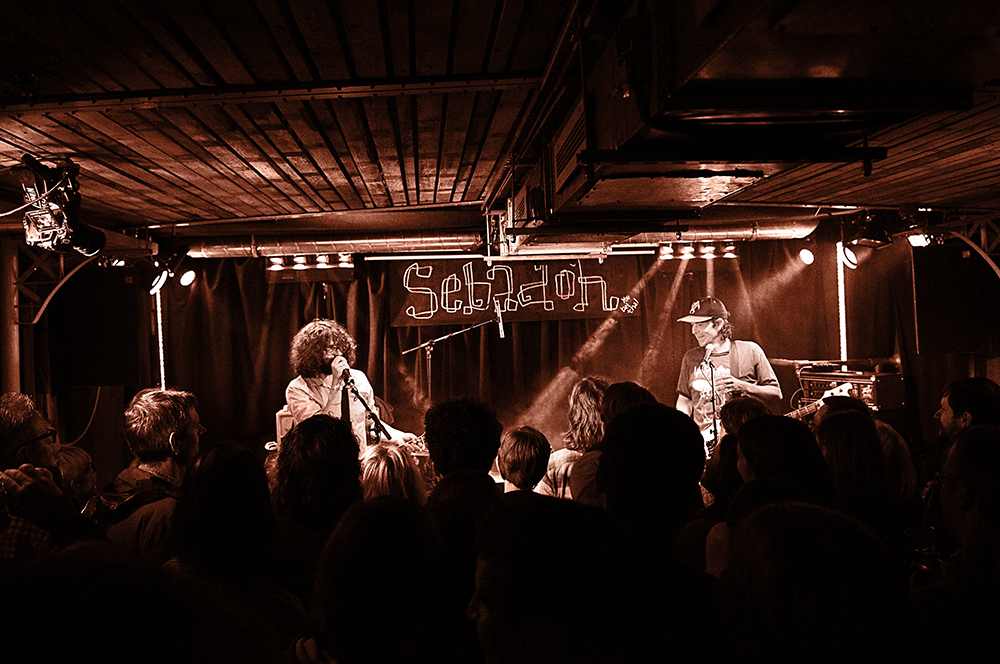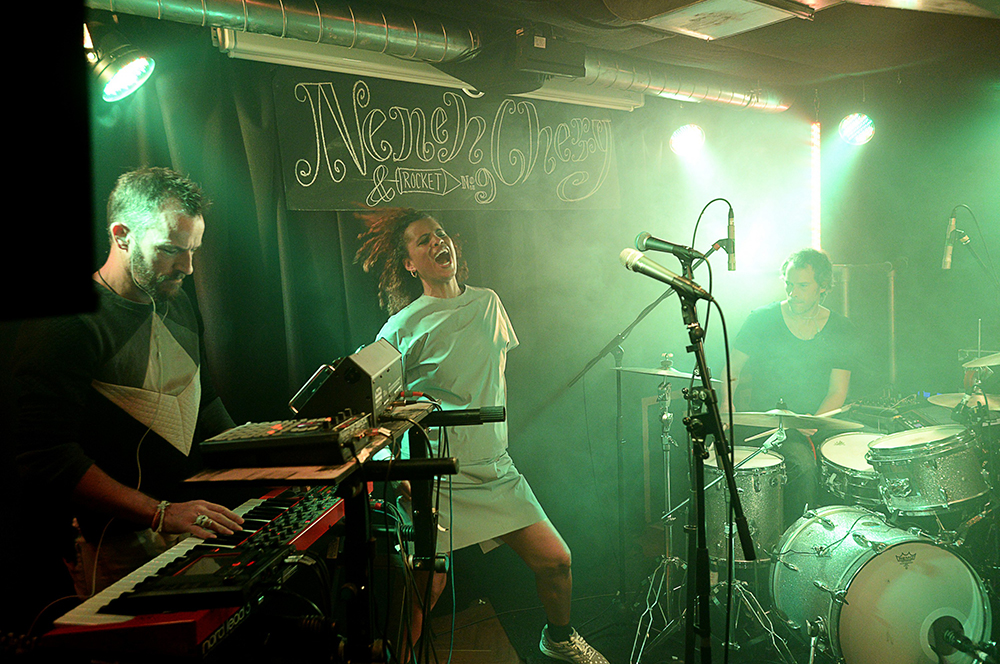Ram has a new jam
Jules Bigg of the Ramsgate Music Hall writes the riffs at the centre of the coastal town’s resurgence
Black Sheep
The low hum and heart-beat-tuned thump of a baseline ripples the smoky air above the clutch of twentysomethings huddling for warmth.
Old brick buildings tagged with incomprehensible spray works form a backdrop and there is a buzz.
Record shops, bars and the latest foodie tryouts are crammed into any available nook and cranny while people spill in, spill out and just spill from numerous establishments and alleyway cut throughs. Is it 1990? Are things you hold in your hand still more relevant than the things you hold in your cloud? Is this Shoreditch?
No, it’s not. It’s an old Kentish seaside town, battered by 30 years of weather and the decline of the staycation and jolly boys Beano trips.
“It stank of everything that I really loved about that area of London, which, I feel, is sort of dying,” says Julian Bigg, the brain and the driving force behind Ramsgate Music Hall.
“I moved to Shoreditch in ‘89, and it was very like Ramsgate is now. It has a similar feel about it. There is that vibe, youthful arty types coming this way, looking to start something.”
The graphic designer moved from London in the mid-2000s, falling in love with Ramsgate on numerous seaside jaunts with his family. Many have, but perhaps not in the numbers we are being regaled with by national newspapers on a weekly basis.
With experience in producing music magazines as well as designing and frequenting his brother’s pivotal and era-defining east London venues (Cargo and Cantaloop), Bigg is a self-confessed music nut.
But it wasn’t until 2013, and some post-festival blues, that he and two music enthusiast friends - former Manchester-based producer Tim Baines and entrepreneur Robin Hyman – decided to initiate a music scene of their own.
“We were coming back from ATP Festival in Minehead on an eight hour drive and pissed off that there was nowhere for us to go to gigs locally. Kent has been notoriously sh*t over the years for bringing music here,” he says.
“I feel a little bit guilty about saying that now, because there are venues like The Forum in Tumbridge Wells. They can get great gigs, it’s historically old and a great venue. But in general, nothing was being done on the gig circuit in Kent.
“The county wasn’t being lassoed in. Bands would come straight out of London and go to Brighton and not head into Kent.”
Spending as much time as it takes to “pour a cup of tea”, the group decided to find a venue.
“We didn’t think it through any more than that,” he says. “That enthusiastic element is what has kept it going. The naivety that we started this project with has kept it going because if we’d have known all the pitfalls of owning a venue like this, we probably wouldn’t have done it.”
On Turner Street – a back lane just off of the high street – a derelict building, empty for four years, was purchased at auction for £70k of the group’s £125k starting budget.
“It had been an old club of varying sorts for many years stretching way back to the 60s. We thought that having £50k left over after purchase, was plenty.”
Some £330k later, it wasn’t.
Through grants, deals and the backing of friends and colleagues, the project continued, and continues still despite “going close to the edge” a few times.
The 135-person capacity venue focuses on quality and individualism with the impressive acoustics a conversational lead from a proud owner, and have reportedly been the key attraction to a number of acts.
The intimacy of the venue is apparent even when empty. The raised stage is high enough for the vertically challenged to have a view, while its subjects remain part of the melee.
The bar upstairs, designed by Bigg, features painted stacks of vinyl and wall-mounted drinking shelves which double as glass cabinets holding tape recorders, boom boxes and retro music blasters from across the past 40 years.
There is also a framed certificate from the world famous NME magazine, proclaiming that Ramsgate Music Hall was Best Small Venue of the year in 2015.
“That was a bit ironic really,” says Bigg, “because we aren’t an f**king NME venue. We don’t put on NME bands because no one bloody comes. There isn’t really and indie youth scene here. The kids around here are into hip hop and drum and bass.
“They aren’t really into guitar bands.”
Nevertheless, before its current sorry demise, the NME had the venue in its sights calling them the “musical hub of Kent” while reviewing a Cate Le Bon performance that helped put the venue in the map.
Notoriety has also come in the form of shout outs from BBC Six Music DJ Marc Riley, who has connections with the group, while the venue’s ability to book high quality bands has continued to soar. But the fame of an act or artist is not the main concern
“If they can’t play, there’s no getting away with it here.”
GIGS
Two or three gigs a week take place at the venue and Bigg is keen that the chosen acts are varied, booking diverse styles of performer.
“We know it’s important to touch all bases of music and put on really good bands. I think that then instills to promoters that we as a venue are willing to take stuff on that is left of centre, and that we are willing to promote it and really try.”
With guest DJs and a license until 2am at weekends, the atmosphere pushing musical boundaries and appreciation of quality has attracted local heavyweights such as 90s New York hiphop outfit The Jungle Brothers, Skip McDonald of Sugarhill gang fame, and London jungle MC Congo Natty, who have also settled in the area.
Among those to perform are Wave Pictures, Nina Cherry, Nathaniel Rateliff, The Amazing Snakeheads and the Sleaford Mods as well as scores of artists looking for an open minded crowd to play to.
“Small venues are the life blood of the touring circuit,” says Bigg. “This is exactly the sort of venue bands should be playing when launching their first album.
“People do now trust what we book. We book slightly above our capacity size in the people we bring and we’ve had some really nice quotes from agents who say we book a much more inspiring calendar than most major towns would put on.”
Bigg regales us with a story about The Avalanches who very nearly played their first gig in 15 years in the UK at the Music Hall before setting off on a tour.
“They cancelled when one of them lost their passport on the plane, so they couldn’t get into the country. That was so frustrating.”
The launch of a recorded and downloadable radio show as well as their own YouTube-style channel showing highlights of all their gigs has continued to build their notoriety.
“Small venues are the life blood of the touring circuit”
“We have a friend who worked on a festival over in New York who has had people speak to him about the Ramsgate Music Hall. They have no idea where or what it is, but it’s got this good mythical name now and it’s because bands, fans and booking agents love it here.”
But it is the customers and music fans close to home that pay the bills. And Bigg recognises a resurgence in the Kent coastal towns.
“There are so many people moving down here now. When we first moved down, the Ramsgate kids all wanted to get away to London, but now they want to stay. “They now see that Ramsgate has got this spirit.
“Areas like this are thriving, because the people that are moving here are forming creative hubs. And that attracts more.”
But this is no fairy story. It doesn’t end here. It takes a lot of hard work from the Ramsgate Music Hall team to keep the business above water.
As it is all too often mentioned, success is 10% inspiration and 90% perspiration.
The Ramsgate Music Hall need to put on gigs, and they need those gigs to be well attended.
“We’ve been pretty close to the edge a few times,” says Bigg. “But we know we are doing something good, and something we f*cking believe in.
“We are bringing something special to an area that was devoid of it. And now, we are bloody well known for it.”







